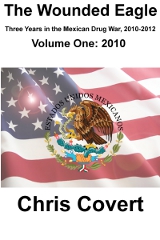Mexican Supreme Court Gift That Keeps on Giving

2011-07-13
Posted by: badanov
By Chris Covert
The Mexican Supreme Court ruled today that crimes involving human rights violations by the Mexican military can be tried in civilian courts, according to Mexican news sources.
The new ruling contradicts a ruling made last May which said that military personnel do not have to be tried in civilian courts for crimes committed against civilians during military operations.
The May ruling was issued as part of the legislative process for the new National Security law now held up in process on procedural grounds. The issue of venue for crimes committed by the military as part of operations has long been a point of objection, especially amongst leftist politicians who say such rules increase the power in the hands of the president.
To read the Rantburg report on the May Mexican Supreme Court ruling on military justice, click here
Much of the fear by the Mexican left is well founded. The Mexican military was used against political movements in the 1960s and 1970s from which several politicians of the mainstream left are now in leadership positions in Mexico.
For example, Jesus Zambrano Grijalva, the current national chairman of the Partido Revolucion Democratica, as a communist was held as a political prisoner for two years in the 1970s in the midst of Mexico's Dirty War against leftist groups including armed groups.
Members of Mexico's now mainstream left do not want to see a return to those days and have fought hard to prevent a recurrence.
Currently, Mexico's Code of Military Justice Article 57 gives the military full control of jurisdiction for crimes committed by soldiers against civilians in military operations.
The new national security law currently held up in process seeks to keep soldiers suspected of serious crimes such as murder and rape within military jurisdiction.
To read the last Rantburg report on the new Mexican national security law, click here
The new ruling effectively says now that not only can Mexican military personnel be investigated and tried by civilian courts, anything regarded as a human rights violation under international law allegedly committed by Mexican military personnel can be investigated and tried by civilian courts.
The only exception is in federal cases in which Mexican federal judges are allowed discretion.
The new ruling presents some obvious problems for Mexican president Felipe Calderon Hinojosa. The new ruling guts not only the mild provisions in the national security law, but it stands military justice on its head.
The ruling can be seen as a gift to Mexican drug cartels, who are under no constrictions as a matter of law. The ruling could not have been more generous if the justices had sent Sinaloa drug cartel leader Joaquin Loera Guzman a marijuana blunt and a case of Twinkies.
Understandably, the ruling applies to all cases in which the military is used be the targets drug cartels or armed political groups. However the total lack of context of the ruling makes clear the military could conceivably be hamstrung by civilian courts in its counternarcotics operations in the future.
The Mexican Army and Marines behave professionally in the Mexican Drug War. For all the literally hundreds of gunfights and operations in a year the US State Department in its annual human rights report could only dredge up five incidents in which the military committed crimes or human rights violations. It is an astounding record of restraint.
To read the Rantburg report on the US State Department Human Rights report on Mexico, click here and here.
In the shooting gallery Mexico has become,the US State Department should have given the Mexican Military a human rights award. It has one coming.



